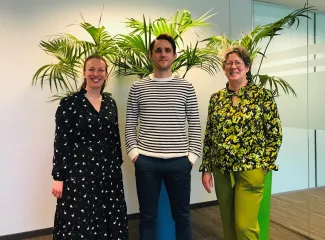How sustainable is an innovation really? VITO is developing an instrument to map this out from the start
As a densely populated, highly developed and industrialised region, Flanders wants (and needs) to contribute to a sustainable climate and energy transition by 2050. To this end, VLAIO's MOONSHOT programme joins the forces of Flemish industry, knowledge institutions and government bodies to develop pioneering technologies that significantly reduce CO2 emissions. Strong and impactful innovations are needed for this, but how do you measure and evaluate the sustainability impact of different innovations at an early stage and in a consistent, science-based way? To this end, VITO, in collaboration with its partners, developed a new analysis instrument for VLAIO, which from now on can also be used in other contexts and regions.

The MOONSHOT-programme sets the ambition "Flemish industry low in carbon and carbon-circular by 2050". Projects under this programme include several innovative technologies and processes to drastically reduce CO2 emissions. To determine how the sustainability effects of these technologies could be measured in an objective and comparable way, there was a need for a study and overarching analysis method.
VLAIO therefore started the assignment 'Development of a methodological framework for the sustainability evaluation of the Flemish MOONSHOT innovation programme' together with Catalisti at the end of 2021. VITO was responsible for the implementation, in collaboration with Deloitte, Antwerp University, Catholic University of Leuven and Ghent University.
An objective, transparent and overarching methodology for sustainability analysis of new technologies
VLAIO's mission was to 'put forward a harmonised methodological framework that allows projects within the MOONSHOT innovation programme to be analysed in terms of their potential economic feasibility and environmental impact’:
- Economic feasibility looks at the calculation of total costs (both operational and investment), revenues and profitability of the project.
- Environmental impact focuses on the contribution to the fight against global warming, more specifically the project's contribution to the Flemish carbon reduction objectives.
Implementation took place in several phases. First, the existing sustainability assessment methodologies were examined and screened in terms of their areas of application, goals and differences. The conclusion was that these existing assessment methodologies often require large amounts of data and time, which can be a problem for technologies that are still at an early stage of development, such as those in the MOONSHOT programme. Consequently, existing methodologies were unsuitable for this project.
Miet Van Dael (VITO): "We proceeded to make a specific selection of indicators, taking into account the purpose and scope of MOONSHOT. The main goal here was to get a clear understanding of the potential sustainability impact of an innovation and the steps needed to realise it."
Application within the MOONSHOT-programme
The analysis instrument guides researchers towards the most sustainable configuration of their technology or idea, taking into account the MOONSHOT context. It does this by setting clear research objectives and helping to determine the technological roadmap towards implementation.
VITO and her partners translated this into concrete methodological guidelines and indicators, including:
- the average cost of a project or innovation per unit of output produced
- the payback time
- the climate impact
- the amount of energy used per tonne of CO2 emissions avoided
In developing the instrument, the possibility of doing the sustainability assessment for an expected future industrial scale was also envisaged, so that technologies of different commercial scales can be objectively compared. The tool also provides an overarching view of the entire value chain. This is crucial to ensure that the beneficial effects of the evaluated innovations (i.e., economic or environmental) are not reversed in other steps of the value chain.
Thus, VITO and its partners eventually developed a universal and overarching analysis template for the sustainability evaluation of the projects and innovations within VLAIO's MOONSHOT programme.
After a successful proof of concept last year, the analysis template is now being effectively applied within the newly approved projects under the MOONSHOT programme.
Helga Pien (VLAIO): "The cooperation with VITO was smooth and constructive and we are very satisfied with the universal instrument they developed to evaluate the sustainability impacts of new projects at a very early stage. The instrument makes it much easier to monitor the impact of projects of various sizes in a standardised way. It also ensures faster reporting to the authorities and other spearhead clusters. Definitely of added value for us."

Analysis of new innovations for solar energy conversion
Meanwhile, VITO is translating the work done for VLAIO to the EIC (European Innovation Council), specifically in evaluating the impact of emerging solar-to-X technologies. Fuels, chemicals and materials made directly from solar energy (and simple building blocks such as water, nitrogen or CO2) represent a growth market of potentially breakthrough technologies. It is crucial to choose the most impactful technology for the right context at a very early stage, and to further develop and adapt it to the needs of society. This is another area where VITO's analysis tool lends itself as it can evaluate the impact of technological innovations at an early stage.
Carina Faber (EIC) "The main goal of the collaboration with VITO is to co-develop a methodology that allows to steer R&I at an early stage towards the most sustainable device configurations – those solar-to-x technologies which will have a clear added value in the broad landscape of existing renewable energy technologies."
Future and wider application of the tool
VITO wants as many stakeholders as possible to be able to work with this method and instrument. Meanwhile, we are working on a training programme for companies based on the work we did for VLAIO and EIC. In this way, we hope to contribute to accelerating the development of the right and most impactful innovations to make our society and planet more sustainable.
Interested in such tailor-made training for your company? Contact Miet Van Dael.


